I hung out with Hugh Hudson at the 2005 Mar del Plata Film Festival. We met in his hotel room, and then discussed what subjects we could cover in a forthcoming q & a. Later that day (or was it the early evening?) we did it in front of an audience. He struck me as a nice, urbane guy who knew most of the angles. I greatly admired Chariots of Fire (who didn’t?) but not Revolution (’85), which pretty much torpedoed Hudson’s career. For me Greystoke (’84) was an intriguing film about primal life vs. the repressive nature of upper-crust British society, and was mostly an in-and-outer. In short, Hudson’s golden chapter lasted five or six years (’80 to ’85).
Day: February 13, 2023
Saura Legacy
40 years ago I was profoundly moved by Carlos Saura’s Carmen, the best of his Flamenco trilogy. It had erotic fire, shook my soul, opened me up to the passion of Spanish dance. It stayed in my head all through the ‘80s, ‘90s, aughts and teens. It’s never left me. In ’02 I felt something similar from the finale of Pedro Almodovar’s Habla Con Ella (‘02), which ended with a sublime dance moment.
Norman Lloyd’s Falling Would’ve Been Better
…if Alfred Hitchcock hadn’t relied on that fake-looking process shot. If I’d been in Hitchcock’s shoes, I would’ve had Universal’s prop department build a special wind-up mechanical dummy, one capable of moving its arms and legs a bit. Then I would’ve mounted the downward-facing camera on the railing of the actual Statue of Liberty torch, and then I would’ve simply dropped the dummy and filmed the long fall.
Then, in the editing phase, I would’ve shown Lloyd losing his grip and starting to fall, then a quick shot of Robert Cummings‘ horrified expression, and then cut to the falling dummy and stay with it until hits the pavement below. I would also have recorded the sound of a cluster of three tied-together watermelons slamming into the pavement from a height of, say, three or four stories.
Happy 104th #NormanLloyd
Saboteur, 1942, directed by Alfred Hitchcock.
Robert Cummings and Norman Lloyd.
"Statue of Liberty" scene.
pic.twitter.com/T4NDXyQWUD— Sergio Rodríguez (@Sergiofordy) November 8, 2018
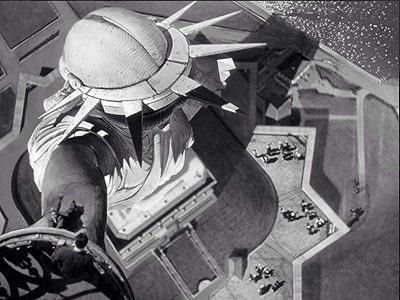
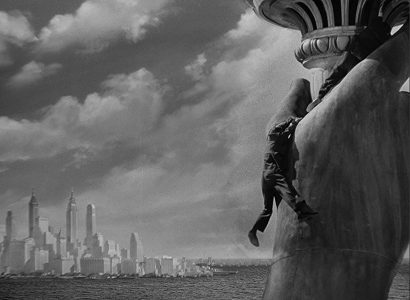
Respected Female Critic Disses “Women Talking”
Gabrielle Marceau is a Toronto-based writer, film critic, editor and instructor. She writes film and pop culture criticism as well as poetry and fiction. Her work has appeared in Cinemascope, Sight and Sound, Reverse Shot and Leste magazine. And she has written adversely of Women Talking, which was adapted and directed by a fellow Toronto person and Canadian Sarah Polley. This strikes me as significant.
Excerpt: “True to its title, the film is chock-full of conversations — moral, practical, theological — that feel, more often than not, formulaic and dry. The characters are not simply mouthpieces for different sides of an argument, but neither are they fully realized.
“They are Salome (Claire Foy) and Mariche (Jesse Buckley), voicing righteous, satisfying anger; Greta (Sheila McCarthy) and Agata (Judith Ivey), interjecting with wisdom and pragmatism; two young girls whose presence reminds us of what’s at stake; and Ona (Rooney Mara), the philosopher, who turns their arguments over and over in her soliloquies, until they are smoothed into benevolent sentiment. If there were a main character, it would be Ona; but her equanimity is frustrating, and her monologuing perhaps the most jarringly monologue-like of the cast.
“The performances are hindered by an approach to storytelling that is literal to the point of obnoxious. (A prime example: over a character’s rhapsodic plea that the community’s young teenage boys be allowed to go with the women should they leave, we see dreamy shots of boys playing in the fields and chatting warmly.)
“The film feels suspended in an unreal world, an effect only heightened by the inexplicable blue tint of the cinematography and the tedious shots of empty church pews and silent kitchens. And though the film is based on a real story — for her 2018 novel of the same name, Miriam Toews was inspired by a Mennonite community in Bolivia where over a hundred women reported being assaulted by men in the community — it cannot transcend the inherent artificiality of allegory.
“[Women Talking] feels as isolated from its real-world analogue — the #MeToo movement and the revelations of sexual misconduct in the film industry — as the colony is from the outside world.”
Riseborough Has A Shot
Friendo: “Seriously, she could win. What Danielle Deadwyler, Viola Davis, Till director Chinonye Chukwu and Woman King helmer Gina Prince-Bythewood have unintentionally done is power her chances.”
HE: “Agreed. That wasn’t their intention, of course, but it was obvious what effect their sore-loser schtick was having when Michelle Yeoh essentially said they should suck it up, lick their wounds and wait in line, like she did for years.”
I Go To Pieces
Words can’t describe how thoroughly repulsed I am by the idea of watching yet another DCU Warner Bros. film, not to mention one that insists on torturing me with the return of General Zod (Michael Shannon)…Lord!
How do I know that The Flash (Warner Bros., 6.16) will be equal to being roughed up by gorillas? The fact that Andy Muschietti is the director, that’s how.
Ten years ago I had dropped to my knees in praise of Mama, a subtle, suggestive horror film which Muschietti directed and co-wrote (and which was produced by Guillermo del Toro). And then Muschjietti sold his soul by directing It (’15), which was aimed at morons by throwing subtlety to the wind, and then It Chapter Two (’19).
Let me get this straight: There are two Bruce Waynes in The Flash, one played by Michael Keaton and another by Ben Affleck, neither of whom are spring chickens. But only Keaton suits up as Batman…right?
Keaton’s version of Wayne hails from an alternate universe. Put another way The Flash ignores Batman Forever (1995, Val Kilmer) and Batman & Robin (1997, George Clooney), in which Keaton was a non-entity. Affleck, on the other hand\ “reprises his DCEU role as Bruce Wayne / Batman, the original version of Wayne from Barry’s timeline and the leader of the Justice League.” Which means it’s some kind of multiverse bullshit, right?
Fear & Suffocation Are Enemies of Great Art
The last 72 words of Amy Holden Jones’ Facebook post, which appeared within the last couple of days, are stark and true and sad. The passage begins with the words “but help me.”
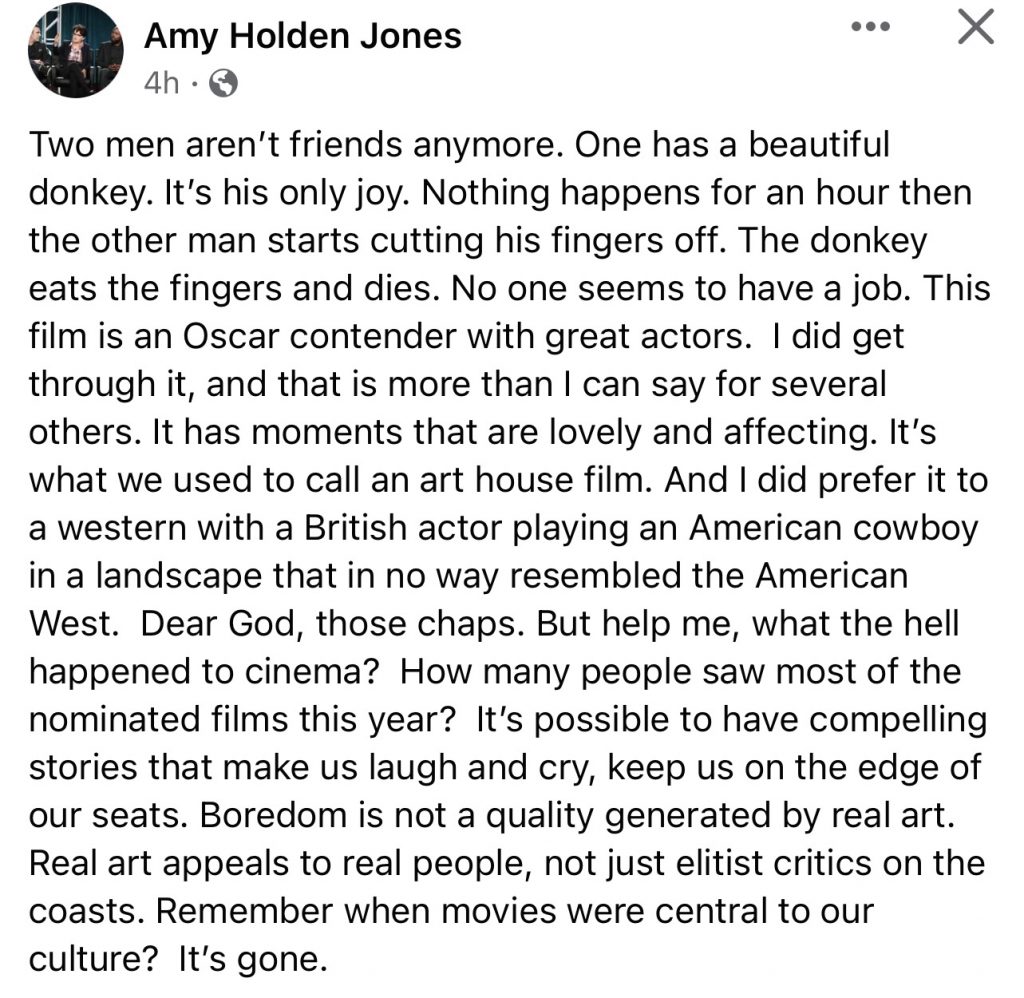
HE to Amy: “Here’s a pretty good answer to ‘what the hell happened to cinema?’ It comes from not just my own thoughts and observations but those of a few others, and it’s called “Don McLean’s ‘The Day The Academy Died.” It was posted on 9.25.22.
Gregg Moscoe and Alex Simon also stirred the pot:
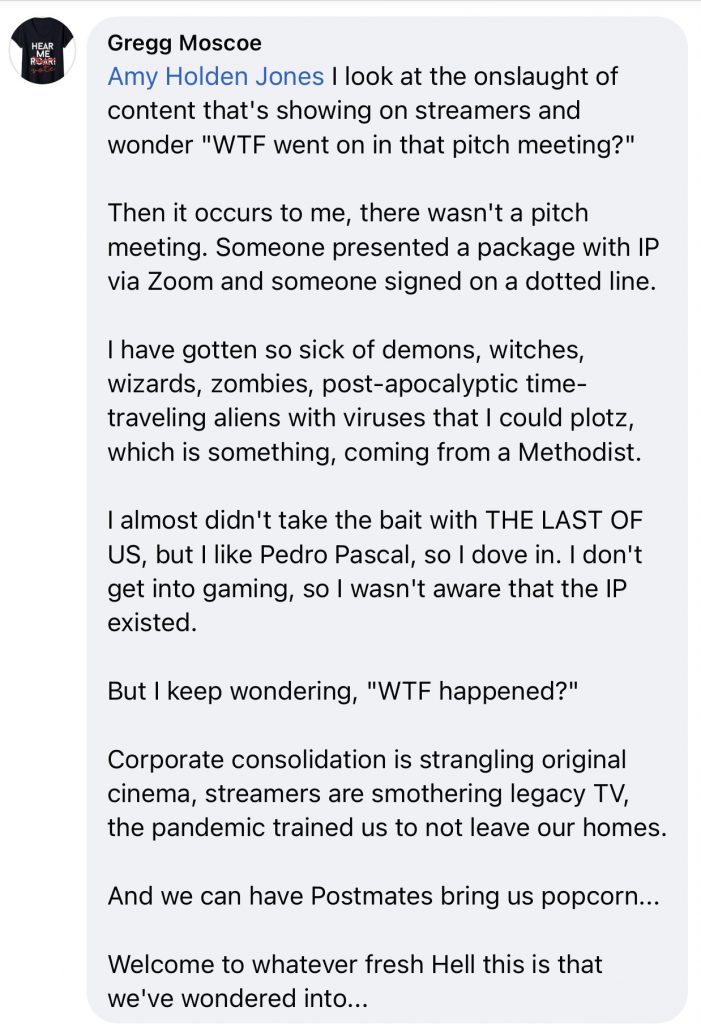
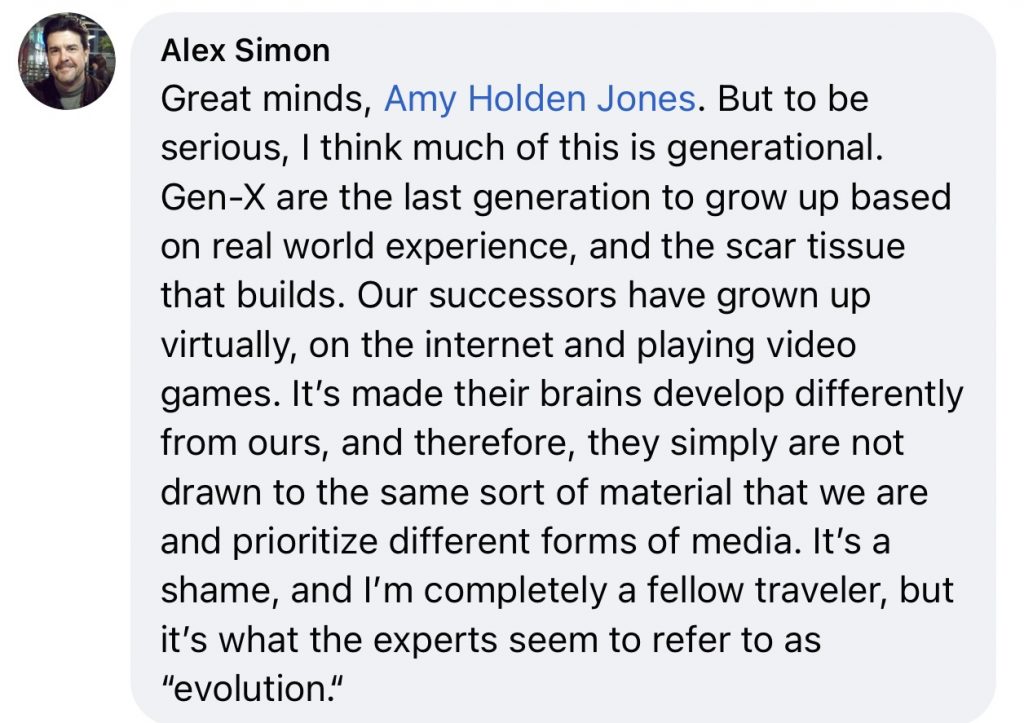
Final HE thought: “Vote for that Riseborough!”
